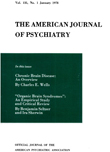SPIRIT POSSESSION IN HAITI
Abstract
Possession as seen in Haiti is a culturally sanctioned, heavily institutionalized and symbolically invested means of expression in action for various ego dystonic impulses and thoughts. It provides a behavioral outlet for much of the impoverished and suppressed peasantry of Haiti. For those who are Voodoo devotees it provides legitimized public roles for private repressed impulses and needs. It serves different needs for different people. For the hungan it provides a flexible and recognizable set of ideas which makes possible the translation of private needs into a publically acknowledged religious chosenness. For the hunsi it is an opportunity for the expression of behavior and emotions. The last type of individual "possessed by a loa" would seem to be unable to channel his uncontrollable impulses into such an acknowledged and useful role for various reasons, usually ones which have alienated him from the mainsprings of the Voodoo cult.
In essence, possession is a useful and culturally sanctioned form of role playing which serves public as well as private needs and is legitimized only insofar as it occurs in the context of Voodoo and in the correct proportions. For those who are out of touch with Voodoo or for those whose possessions last longer than the ceremonials warrant it is not legitimized and is considered a form of fobie. The similarity of possession phenomena and psychiatric illness plus the identical explanations for loa possession and supernatural fobie suggests a strong relationship between the two and adds weight to our formulation of ritual possession as an acceptable form of "going crazy."
Access content
To read the fulltext, please use one of the options below to sign in or purchase access.- Personal login
- Institutional Login
- Sign in via OpenAthens
- Register for access
-
Please login/register if you wish to pair your device and check access availability.
Not a subscriber?
PsychiatryOnline subscription options offer access to the DSM-5 library, books, journals, CME, and patient resources. This all-in-one virtual library provides psychiatrists and mental health professionals with key resources for diagnosis, treatment, research, and professional development.
Need more help? PsychiatryOnline Customer Service may be reached by emailing [email protected] or by calling 800-368-5777 (in the U.S.) or 703-907-7322 (outside the U.S.).



